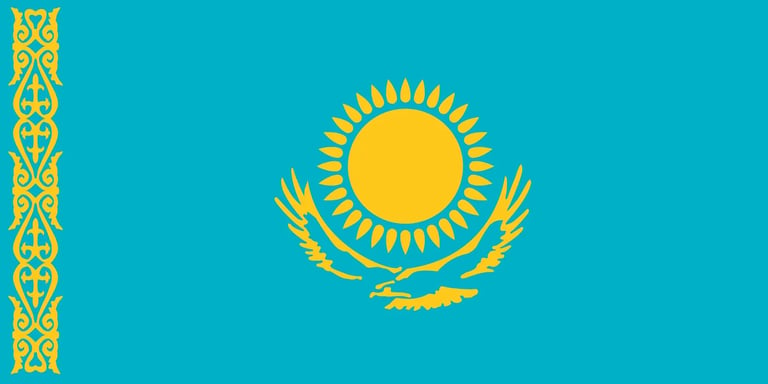Kazakhstan
From Wikipedia


The Republic of Kazakhstan, is a landlocked country mostly in Central Asia, with a part in Eastern Europe. It borders Russia to the north and west, China to the east, Kyrgyzstan to the southeast, Uzbekistan to the south, and Turkmenistan to the southwest, with a coastline along the Caspian Sea. Its capital is Astana, while the largest city and leading cultural and commercial hub is Almaty. Kazakhstan is the world's ninth-largest country by land area and the largest landlocked country. It has a population of 20 million and one of the lowest population densities in the world, at fewer than 6 people per square kilometre (16 people/sq mi). Ethnic Kazakhs constitute a majority, while ethnic Russians form a significant minority. Officially secular, Kazakhstan is a Muslim-majority country with a sizeable Christian community.
Kazakhstan has been inhabited since the Paleolithic era. In antiquity, various nomadic Iranian peoples such as the Saka, Massagetae, and Scythians dominated the territory, with the Achaemenid Persian Empire expanding towards the southern region. Turkic nomads entered the region from as early as the sixth century. In the 13th century, the area was subjugated by the Mongol Empire under Genghis Khan. Following the disintegration of the Golden Horde in the 15th century, the Kazakh Khanate was established over an area roughly corresponding with modern Kazakhstan. By the 18th century, the Kazakh Khanate had fragmented into three jüz (tribal divisions), which were gradually absorbed and conquered by the Russian Empire; by the mid-19th century, all of Kazakhstan was nominally under Russian rule. Following the 1917 Russian Revolution and subsequent Russian Civil War, the territory was reorganized several times. In 1936, its modern borders were established with the formation of the Kazakh Soviet Socialist Republic within the Soviet Union. Kazakhstan was the last constituent republic of the Soviet Union to declare independence in 1991 during its dissolution.
Kazakhstan dominates Central Asia both economically and politically, accounting for 60 percent of the region's GDP, primarily through its oil and gas industry; it also has vast mineral resources. Kazakhstan also has the highest Human Development Index ranking in the region. It is a unitary constitutional republic; however, its government is authoritarian. Nevertheless, there have been incremental efforts at democratization and political reform since the resignation of Nursultan Nazarbayev in 2019, who had led the country since independence. Kazakhstan is a member state of the United Nations, World Trade Organization, Commonwealth of Independent States, Shanghai Cooperation Organisation, Eurasian Economic Union, Collective Security Treaty Organization, Organization for Security and Cooperation in Europe, Organization of Islamic Cooperation, Organization of Turkic States, and International Organization of Turkic Culture.
Nassouh GSPI
Assessing global strength through various metrics.
contact us
gspi@nassouh.com
© 2025. Nassouh, All rights reserved.
